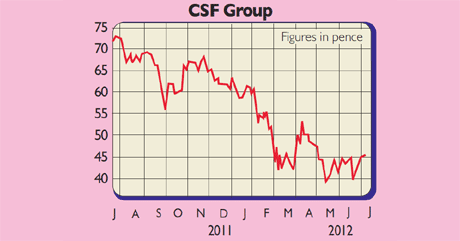Get the latest financial news, insights and expert analysis from our award-winning MoneyWeek team, to help you understand what really matters when it comes to your finances.
You are now subscribed
Your newsletter sign-up was successful
Want to add more newsletters?

Twice daily
MoneyWeek
Get the latest financial news, insights and expert analysis from our award-winning MoneyWeek team, to help you understand what really matters when it comes to your finances.

Four times a week
Look After My Bills
Sign up to our free money-saving newsletter, filled with the latest news and expert advice to help you find the best tips and deals for managing your bills. Start saving today!
Cloud computing is here to stay. It involves the remote storage of applications and data which are accessed remotely via high-speed internet. According to analysts at Bain, this $20bn sector will grow rapidly to nearly $150bn by 2020, driven by demand for software-as-a-service, mobile applications and gaming. This is where CSF comes in. The firm develops (60% of sales) and operates (40%) data centres across southeast Asia.
To date, it has designed, built and fitted out more than 200 such facilities for firms such as BMW and HSBC. It also operates five world-class data centres of its own for tenants that include large telecoms and web search firms. The aim is eventually to create an interconnected hub of sites across the entire sub-continent, ranging from Singapore and China to Thailand and Indonesia.
The immediate priority is to enhance its leading position in Malaysia, a market which is expected to grow at 16% a year over the next five years. That's why the firm raised £28m in March 2010 to construct a new state-of-the-art facility (CX5) in Cyberjaya. This was completed in January. The first section has been contracted out under long-term tenancies (of three to ten years), with the board confident the other two will be fully occupied by March 2014.
MoneyWeek
Subscribe to MoneyWeek today and get your first six magazine issues absolutely FREE

Sign up to Money Morning
Don't miss the latest investment and personal finances news, market analysis, plus money-saving tips with our free twice-daily newsletter
Don't miss the latest investment and personal finances news, market analysis, plus money-saving tips with our free twice-daily newsletter
Last year's figures were mixed, with positive momentum in the hosting arm being partly offset by higher start-up costs in a 49% joint venture. Net cash at the end of March was £10.6m, and this should be further bolstered by £14.7m over the next two years from the sale of the ownership (but not the management) of the CX5 building to the Malaysian sovereign fund under a 25-year sale-and-leaseback deal. The idea is for CSF to release capital and recycle the proceeds.
CSF Group (aim: CSFG), rated a BUY by Cenkos

House broker Cenkos is forecasting turnover and EBITDA of £51m and £11.6m respectively for the year ending March 2013, rising to £55.9m and £13.3m 12 months later. I value the group on a ten times EBITDA multiple for the hosting arm, and a six times ratio for the fit-out division. Adding on the cash, the intrinsic worth is about 65p per share.
Since this is a small company focused on Asia, investors need to be relatively thick-skinned. CSF could be squeezed by bigger rivals and then struggle to reach critical mass. Wholesale bandwidth costs are relatively high in Malaysia, making the country less attractive to overseas business. The firm could also be hit by bad debts, foreign-exchange fluctuations, project delays and new technologies. Southeast Asia is prone to seismic activity and extreme weather, which might also damage facilities.
All the same, the firm is well positioned to benefit from soaring internet use and e-commerce. It even offers income-seekers a 4.2% dividend yield, which is unusual for a hi-tech company. Cenkos Securities has a price target of 80p.
Rating: BUY at 44p (market cap £70m)
Paul Hill also writes a share-tipping newsletter, Precision Guided Investments. See www.moneyweek.com/PGI or phone 020-7633 3634.
Get the latest financial news, insights and expert analysis from our award-winning MoneyWeek team, to help you understand what really matters when it comes to your finances.
Paul gained a degree in electrical engineering and went on to qualify as a chartered management accountant. He has extensive corporate finance and investment experience and is a member of the Securities Institute.
Over the past 16 years Paul has held top-level financial management and M&A roles for blue-chip companies such as O2, GKN and Unilever. He is now director of his own capital investment and consultancy firm, PMH Capital Limited.
Paul is an expert at analysing companies in new, fast-growing markets, and is an extremely shrewd stock-picker.
-
 Last chance to invest in VCTs? Here's what you need to know
Last chance to invest in VCTs? Here's what you need to knowInvestors have pumped millions more into Venture Capital Trusts (VCTS) so far this tax year, but time is running out to take advantage of tax perks from them.
-
 ISA quiz: How much do you know about the tax wrapper?
ISA quiz: How much do you know about the tax wrapper?Quiz One of the most efficient ways to keep your savings or investments free from tax is by putting them in an Individual Savings Account (ISA). How much do you know about ISAs?